"Take cloves and crush them in a mortar. Pour black tea over them and let it steep. Heat red wine in a pot. Squeeze lemon and orange and add. Use the pulp. Add tea and bring almost to the boil. Sweeten with honey." A recipe I always bring out when it gets cold outside and night beats day early; time of the coming festive season, time before Christmas. It's just one of more than 500 recipes I found on the internet at the drop of a hat. They may be similar, but they always set different, new accents. For example, there is cherry juice, elderberries, cinnamon sticks, aniseed stars, vanilla beans, ground cardamom and, and, and - also wine. It is almost unbelievable what can and may be added.
Now, however, another horror story: "Controversy in Meissen! Figure-conscious winegrowers sweeten their drink with a low-calorie sweetener. So there is a new drink in Meißen called "Heiße Rebe" (Hot Vine) - the official horse whinnies. Actually, however, it is the same as what is available at every "Christchindlimarkt": Mulled wine.
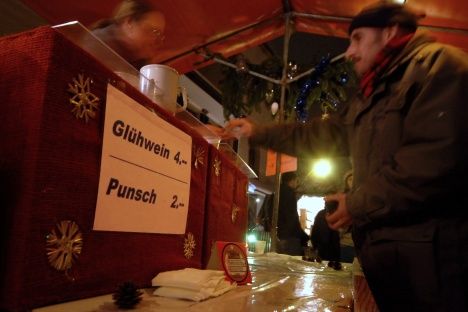
|
| Mulled wine at the Christmas market (Photo: P. Züllig) |
It's hard to believe, but the decree from Meissen is even worth a minute and 56 seconds to ARD (MDR Sachsenspiegel). Here's the proof: http://www.ardmediathek.de/mdr-sachsen/sachsenspiegel/gluehweinstreit-in-meissen?documentId=12714418. Does it really have to be like this, is my basic feeling for Christmas allowed to be trampled underfoot like this? Hot vine instead of mulled wine. What would Christmas be without the cinnamon-aniseed-orange-clove scent that emanates from wine at Christmas time? The wine lover - I count myself among them - has always had problems with mulled wine, and they are much more serious than those of Meissen. Wine blended with fruit juices, cloves, cinnamon and who-knows-what-else, heated to just before boiling point, served in decorated cups or even in a mug, is that allowed?
For many wine drinkers it may not! For them, wine is more important - perhaps even more noble - than any pre-Christmas Advent atmosphere with mulled wine. In any case, they insist that mulled wine is not wine. (They are probably even less in agreement with the "Heiße Rebe") In public they avoid any mulled wine stand, and if they have to - because of the cold, their partner - they make sure that no other wine lover sees it.
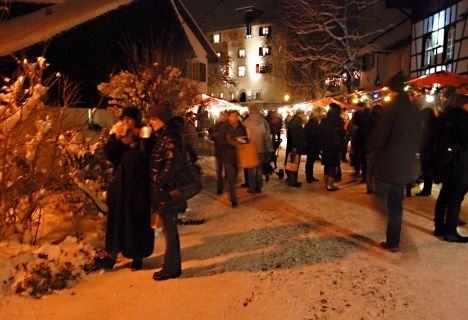
|
| "Hot vine" against the cold (Photo: P. Züllig) |
Now, however, absolution has been granted to all secret sinners by the head sommelière of the five-star Hotel Excelsior Ernst in Cologne. She tested the mulled wines at Cologne's Christmas markets on behalf of the "Kölner Stadt-Anzeiger" and concluded: „... an extravagant, multi-layered mulled wine which - characterised by the aromas of star anise, clove and liquorice - tastes exceptionally good despite being significantly sweeter...". Another mulled wine, however, "convinces with its clear, powerful nose and beautiful wine taste with discreet herbal notes and low sweetness". Expertly impeccable judgements in correct wine language. Only the Parker points are missing.
What irritates me most personally are the white mulled wines, which apparently also exist. For me, mulled wine is red, just as the fir tree is green and the snow is white. Everything else is - for me - fake. But no wonder, in the land of Rieslings, mulled wines can also turn white, good for all avowed white wine drinkers.
"Glow", I am instructed, is the "premium" of the mulled wines, produced by the Friedrich Altenkirch winery (Rheinhessen) "from high-quality Prädikat wines and refined with exquisite spices from the spice manufactory 'Spirit of Spice'". The winery manager explains: "It is not the sweetness that dominates. The taste of the wine, supported by an individually composed spice blend, makes it a mulled wine where the wine is in the foreground. A mulled wine for all wine lovers and mulled wine drinkers who appreciate quality."
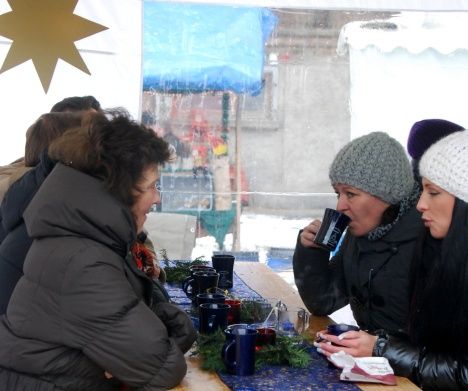
|
| It's not about quality here Photo: P. Züllig) |
A sensible Christmas present for wine lovers, I think. But then I get confused again. Among 35 "gift ideas for wine lovers" on "rotwein-weisswein", the wine blog for connoisseurs, mulled wine is not included. And on the website of the winery of "Glow" glows in red letters: "Unfortunately sold out again!" So the subscription for the 2013 vintage would probably be the only thing to do. Or is it? A cup of mulled wine has - I read on - more than 200 calories, more than half a bar of chocolate. That's tough for a Swiss: should I now give up chocolate - it's also an essential part of the Christmas spirit - or add a few hundred calories?
That's where the clever minds from Meissen come to mind again. Their solution: stevia, the natural product extracted from the "sweet herb", which is said to have 450 times the sweetening power of sugar. The product has been approved by the EU as a food additive with the designation "E 960" for a year now. So from now on I can also drink legal mulled wine, which has much fewer calories.
But there is one more question that concerns my neighbour, who - out of conviction - does not drink alcohol. How much alcohol is left in a wine that has been burnt out? Not much, because the alcohol has evaporated through heating, some say, others: "Heating concentrates the alcohol content even more... but that's probably the point of the exercise!" The minimum alcohol content is set by law at 7 percent by volume. And what if it doesn't reach this value? Is it then no longer mulled wine, but just "hot vine"?
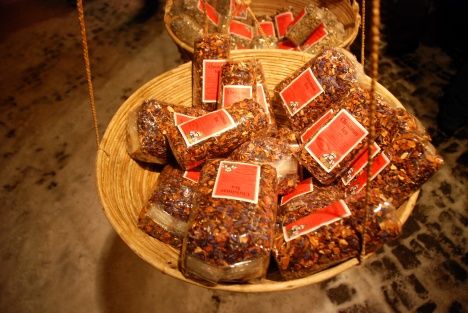
|
| The quality is also determined by the spices (Photo: P. Züllig) |
Now the confusion is perfect. What should I tell my alcohol-critical neighbour, or even pour him some? Alcohol-free mulled wine? The "Chefkoch.de" helps me out of a jam, it also has mulled wine recipes without alcohol in store:
"Take grape juice, apple juice, apricot juice, currant juice (black), elderberry juice, lemon juice, quince juice (dispensable), some grenadine, blueberries, chopped almonds, a stick of cinnamon and a mulled wine bag. Put all the juices in a saucepan; add the Glühfix and cinnamon, heat over a low heat and leave to infuse for 10 minutes. Remove the Glühfix and cinnamon; add blueberries and almonds and serve." I'm already writing the wish list for all these juices so that next year, when it's Christmas again, they'll all be there. I can always buy the "mulled wine bag" at the Christmas market.
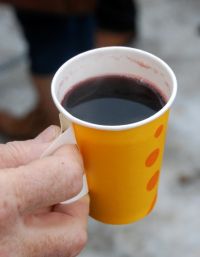
|
| The time for "mugging" is over. Cheers! (Photo: P. Züllig) |
Sincerely
Yours